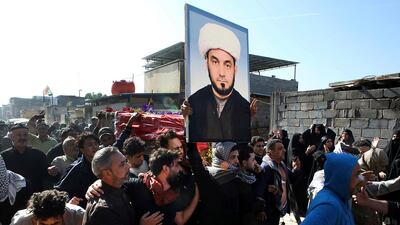Iraqi police say a Muslim cleric was killed outside his home after he suggested demonstrators should take up arms over poor public services in Basra.
Wissam Al Ghrawi was a prominent figure in protests over recent months demanding clean water and reliable electricity in the southern Iraqi city. Basra province generates more than 90 per cent of Iraq's oil exports but suffers from contaminated drinking water and regular blackouts.
Basra police say Al Ghrawi was shot and killed in front of his city centre home by unknown assailants late on Saturday.
Al Ghrawi was filmed at a protest on Friday saying clerics would issue a fatwa within days on taking up arms. The video was shared widely on Iraqi social media.
_______________
Read more:
Iraqi war victims turn to social media to find medical help
In Iraq, bloody tribal custom now classed as terrorism
Hundreds of ISIS fighters 'trying to cross into Iraq from Syria'
_______________
Associates and relatives of Al Ghrawi paraded his coffin around parts of the city on Sunday, demanding the police identify the killers and bring them to justice.
"Why was Sheikh Wissam Al Ghrawi killed? Because he asked for clean water? Because he asked for jobs for the unemployed? Is this the price he paid for defending his country?" said civic activist Mohanad Al Ghrawi, a distant relative.
Al Ghrawi is at least the second activist to be killed in what appeared to be a targeted assassination since protests swept Basra last summer. One of the organisers, Soad Al Ali, was killed by a gunman in September, after protesters began directing their ire toward Iran, which they saw as exerting undue influence over national politics.
Demonstrators set fire to the Iranian consulate and attacked the headquarters of the various Iran-backed militias and parties that operate with impunity in the city. Most of the city's official government buildings were torched as well.
Police said Al Ali's killing was over a personal matter.
Suspicions again turned toward the militias, collectively known as the Popular Mobilisation Forces or Hashed Al Shaabi, on Sunday.
"We say here, once again, to the Basra security and police — have you done your job to stop these militias that kill the youth and intellectuals?" said Mohanad Al Ghrawi.
The PMF were integral to Iraq's war against ISIS and paid salaries to hundreds of thousands of fighters, many of whom were drawn from Iraq's impoverished southern provinces.
But with the war declared won late last year, attention has turned to Iraq's high unemployment and decaying infrastructure. Demonstrations erupted in the south last summer after regular blackouts appeared to grow worse and, in Basra, murky water began flowing out of taps. Health authorities said tens of thousands of residents were hospitalised in the summer months for stomach illnesses.

